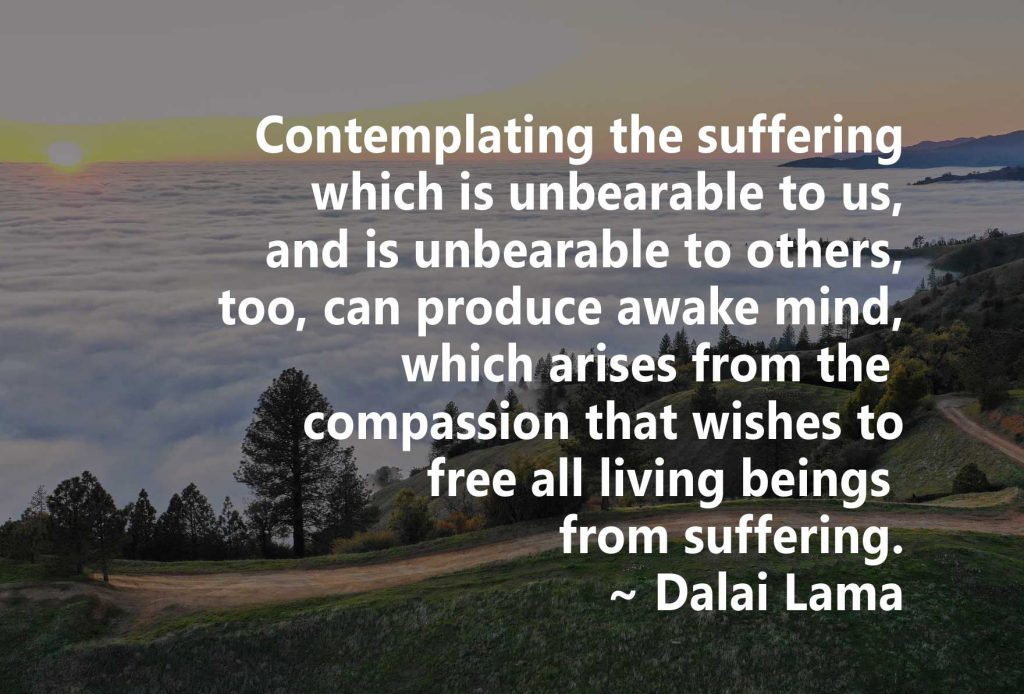Article 1 in Series: POSITIVE DISCUSSIONS OF DIFFICULT TOPICS In this series, we will highlight how to have a positive discussion when the topic is difficult. Difficult topics typically divide people, positive discussions between divided opinions allow us to learn, grow and become a better community as a whole. Part 1 focuses on standing on their ground first with compassion. You must try to understand before you seek to be understood.

It is human nature to learn by moving away from pain and toward pleasure. When we experience something, there is an internal gauge that enables us to decide whether is it pain or pleasure. When we feel “too much pain” we are motivated to change. On a scale of 1 to 10, where is my pain (one = full pleasure ; ten = full suffrage)?
Each person carries their own personal scale AND their own personal gauge! They create their own scale based on both the best and the worst thing that has ever happened to them. If I had my car stolen, I might rate my grief level at seven (7). If a Prisoner Of War had their car stolen while they were locked in a 3 x 5 foot box in the middle of a jungle, they might rate having their car stolen as a zero (0). The scale at which we all feel grief, pain, hurt and suffering is completely subjective. Ironically, the feeling of a 10 is exactly equal to your fellow companions. In this we can find our compassion. My ten feels the same as your ten, even though the levity of the circumstances may be dramatically different.
Example:
Let’s say Connor and Jada were both feeling an 9 on the scale of suffrage. Connor had his house burn to the ground, just as a dump truck plowed into his brand new car, followed by being fired by his boss. For Connor, this is an 9.
On the other hand, Jada has lead a fairly golden and protected life. On her 16th birthday, she was gifted a brand new Mercedes C Class, champagne in color. She had clearly requested a pearl white color, not champagne! For her, this is a 9 on the scale of suffrage.
As an onlooker, an outsider, I can see both Connor’s and Jada’s suffering, comparing both their experiences and judge them both against MY scale. I can determine that Connor is justified – Jada is not. I might even say to Jada, “Calm down, it’s not THAT bad”. And we all know what type of reaction that would elicit in Jada with her full 9 temperament.

I can even compare Connor’s suffering to my own and determine that although Connor’s has it worse than Jada, it is still nowhere near as bad as mine because I suffered a loss in the tragic death of a family member. Connor suffered a loss of just “things”, whereas I lost a life in my life that will and can never be replaced.
Now, if I just had a death of a loved one, Connor might look at my circumstances and say that HE thinks HIS suffering is more justified than mine. Connor values his house, car, and job because he has a new baby on the way. He needs to provide for his family. Whereas my death in the family, was from someone older and that would die eventually, my loss was eventual and expected.
It is ALL a matter of perspective. The suffering gauge all relies on your ATTITUDE about the situation.
The point is that we all FEEL suffering at the same level, regardless of the exact circumstances, based on both our previous experiences and the VALUE we place on the lost situation or opportunity. As humans we mitigate our lives through these lenses, between us and them, as well as us and our younger selves. How many times did we feel the world just dropped out from underneath us when we were young, when our older selves realized later that it wasn’t that big of a deal.
Compassion For Others Who Are In Their Depths
Knowing that we all FEEL suffering on the same scale, allows us to find compassion for others who are going through circumstances. This process allows us to be productive in supporting people as they go through the worst time of their lives. And yes the worst might be when they were gifted the wrong color car.
Those that have suffered the most CAN develop a larger capacity of compassion for those who have not suffered. This is what Buddha teachings bring to us. Understanding the root of suffering within our lives, and the useful nature it brings to our lives, actually lessens the painful feeling. And it is this compassion that will help you manifest pure joy, knowing, understanding, and pure giving.
When people speak about their suffering, they are asking to be heard, to be seen, to be understood. Validation of their feelings is the first path to connecting with them and helping them through to a higher state of being. Personal understanding of the suffering through which you endured leads the way toward empathetic listening, speaking to their level of suffering regardless of the circumstances. This can provide a mirror to which they move through their grief, shifting their gauge to include the latest “worst thing” and broadening their understanding of themselves and others.
Deep Importance of Suffering
Although most of us don’t enjoy the suffering process, it is as important to the enlightenment of our being. It is the path through suffering that paves the way to a resilient life. Without feeling the pain, we cannot see the contrast of our life’s joys. In fact, lack of suffering could bring less personal value to the joy in life. Contrast plays a very important role in our lives. It helps us identify pain, and illuminate pleasure. With this guiding internal compass, we can better understand our purpose, role, and direction.
For example: If I didn’t have that painfully disturbing job in corporate America …. if I didn’t get frustrated on a daily level …. if I didn’t experience the corporate warfare between colleagues of being thrown under the proverbial bus each week …. I wouldn’t have found the understanding that this lifestyle isn’t for me. Instead, I looked at what WAS working in my life (pleasure, ease) and focused on a path in that direction. Guiding by contrast.
Suffering is our guide to deep, long-lasting, positive change.
Related Topics:
– Modern Take on the Root of Suffering – Deepak Chopra
– Four Noble Truths on Suffering – Buddha


